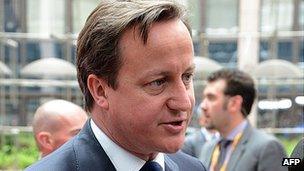David Cameron seeking action on tax avoidance at EU summit
- Published
- comments

Mr Cameron is calling for a US-style cross-border tax information exchange
David Cameron is urging EU leaders to back global action against tax evasion and "aggressive" tax avoidance that is causing nations "staggering" losses.
The prime minister is meeting his European counterparts in Brussels to discuss ways of cracking down on those who do not pay their fair share.
It comes amid a row over the tax paid by firms like Google and Amazon.
The CBI has warned politicians not to "moralise" about tax or rush to judgement without the facts.
The business lobby group said paying tax was not "optional" and that firms must make "responsible judgements" with the interests of their shareholders, stakeholders and society at large in mind.
'No absolutes'
But it warned politicians against engaging in a "moral debate" over the issue and said they must consult with business before introducing any new rules.
"As politicians pursue fairness it is important that any criticisms are grounded in fact and hasty solutions or political point-scoring do not trigger long term unintended consequences," the organisation's chairman Roger Carr said.
"Tax avoidance cannot be about morality - there are no absolutes."
He urged Mr Cameron and other leaders "to fix the rules internationally, not unilaterally", adding that "independent action can cost competitiveness and cause confusion".
The taxation issue is on the agenda of the latest EU summit - which will also discuss energy policy - at the request of the UK, France and Germany.
Mr Cameron wrote to EU leaders ahead of the meeting urging a US-style cross-border tax information exchange. The UK, Germany, France, Spain and Italy are currently testing such a system and want to launch it by the end of the year.
Mr Cameron also wants G8 and EU meetings to include country-by-country reporting of where companies pay their tax.
As he arrived at Wednesday's meeting, the prime minister said competitive tax rates were vital for securing investment but firms must abide by the rules.
"That means international collaboration, sharing of tax information," he said. "It is important that we make sure we act together to make sure we do everything on this agenda."
The BBC's Europe Correspondent Matthew Price said there was "growing unity" about the issue across the EU, with an estimated one trillion euros lost every year due to individuals and companies not paying as much tax as they could do.
But Labour leader Ed Miliband has accused the prime minister of not backing up his rhetoric with "concrete proposals" and said a future government led by him would be prepared to act on its own in the UK.
Low-tax regimes
After the four-hour summit, Mr Cameron will travel to Paris to meet French President Francois Hollande at the Elysee Palace where co-operation on tax evasion and avoidance as well as tackling corporate secrecy will again be on the agenda.
The meetings come two days after Mr Cameron wrote to 10 British overseas territories and crown dependencies, including the Cayman Islands and the Isle of Man, urging them to "get their house in order" and sign up to international treaties on tax. Critics claim such places, which operate low-tax regimes, are used by companies for tax avoidance or evasion.

The party leaders have been under pressure to raise the issue with Google boss Eric Schmidt
Tax avoidance, where companies operate within the rules to avoid paying taxes, and tax evasion, which is outside the law, have risen high on the political agenda in recent months.
High-profile companies like Google, Amazon and Starbucks have faced criticism in the UK for the low levels of tax they appear to pay compared with the size of their businesses.
Speaking on Wednesday, Mr Miliband accused Google of going to "extraordinary lengths" to limit UK tax payments.
'Cat and mouse'
Deputy Prime Minister Nick Clegg said it was unsurprising that firms were trying to exploit the "crack and crevices" of national tax laws and said he had raised the issue with Mr Schmidt at a Downing Street reception earlier this week.
The government was reducing corporation tax, he said, and, in return, it expected firms to pay their fair share of tax.
He acknowledged individual countries' tax systems were often "arcane" and were struggling to keep pace with "disembodied" businesses operating across national borders.
"We have got to make sure the rules apply much more evenly and strictly across the piece and so big companies cannot play cat and mouse with different national tax administrations," he said.
Apple boss Tim Cook defended the firm's practices when he appeared before the US Congress on Tuesday, insisting it complied with both the letter and the spirit of the law.
Oxfam, meanwhile, has suggested people using tax havens are depriving the world of more than £100bn in lost revenue.
"Talking tough on tax whilst continuing to usher a third of the world's wealth into UK tax havens, risks making a mockery of David Cameron's leadership at the G8 Summit in June," its head development finance and public services Emma Seery said.
- Published22 May 2013
- Published22 May 2013
- Published22 May 2013
- Published21 May 2013
- Published20 May 2013
- Published19 May 2013
- Published16 May 2013
- Published11 May 2013